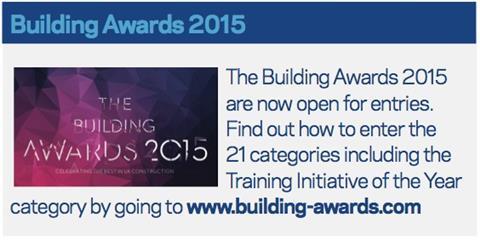Back in September we introduced you to our Class of 2014: 14 young recruits embarking on their careers in construction. Three months later, we ask them how they’re getting on - and if the industry is living up to their expectations

In September Building introduced its Class of 2014 - 14 bright young recruits in their first jobs in the industry - to try to get a handle on the attractions and difficulties facing those considering a career in construction.
Our group - seven women, seven men - includes four architects, four surveyors, two engineers, two contractors and two housebuilders, representing the breadth of intake of professional talent entering construction at a time when the availability of new recruits is the central issue facing construction leaders.
I am disappointed at the amount of unpaid internships there are. Some of my fellow students have had to do them
Emma Taylor, Assael
In our initial feature in September the recruits spoke of their hopes of working in a dynamic, high-tech industry where they could feel the pride of leaving a positive mark on the communities in which they were to work. However, a number also spoke of their fears about entering a sector subject to severe cyclical highs and lows, and which has not had a reputation for employing those outside of the white, male stereotype.
Here, we catch up with the same recruits three months on, to see how the experience of actually working in the sector has - so far - matched up to their expectations. On the whole they’ve been pleasantly surprised, with few registering disappointments. However, a number have been somewhat bewildered at the sheer complexity of the modern construction industry, raising questions over whether their technical training is doing enough to prepare them for the reality of the industry. A selection of the answers are here, with the full interviews available online.

Fergus Ellis
Development assistant, Barratt London
Q How has your perception of the industry changed since you joined?
A There is a huge focus on innovation, which I didn’t expect when I joined. Many aspects of the industry are far more complex than I’d anticipated, and I now better appreciate the challenges we face as an industry and a company.
Q What has been the most enjoyable part of your job?
A Working on a scheme from the very beginning, and learning how to design a concept and seeing it develop and mould into a tangible product that’s part of the London landscape.
Q What’s been the most challenging part of your job?
A As I didn’t have any formal training or background in housebuilding, it was tough building my industry knowledge, while simultaneously learning about business practices on such a large scale.
Q If there’s one thing you know now you wish you’d been told before starting, what would that be?
A There’s a lot more to learn than you’d think - I felt coming into the business I’d hit the ground running, but now I realise there’s a huge amount to learn before I’ll be taking on more responsibility.
Q Has there been anything about the industry that has disappointed you?
A Today, consumers are used to having so much information at their fingertips. I don’t think the industry is making the most out of digital innovation - for example, when I was looking to buy a car I could select the colour and fabric of the interior at the click of a button.

Marija Ambrasaite
Part 1 architectural assistant, RHWL Architects
Q How has your perception of the industry changed since you joined?
A Already, since I joined RHWL Architects in September, I have realised how complex and challenging an architect’s day-to-day role is in real life and how different it is from the academic teaching of the subject. Architects have to manage far more than just the design aspect of a project.
Q What has most surprised you about your job?
A The collaboration in order to realise an architectural design and deliver it to the highest standard. The level of communication and drive to share ideas has inspired me to believe that everything you can imagine is potentially possible.
Q What has been the most enjoyable part of your job?
A My involvement in Crowne Plaza Hotel project at Albert Embankment in central London. Learning how the building is put together has complemented my skills developed at the university.
Q What’s been the most challenging part of your job?
A The most challenging part of an architect’s role is to find the balance between social, ecological, political and economic spheres. The more you integrate them, the more sustainable your project becomes and so more acceptable to today’s standards, which encourages a holistic approach.
Q If there’s one thing you know now you wish you’d been told before starting, what would that be?
A I would like to see a more direct link between university and practice as this would help graduates integrate faster into the real projects/work environment. The alignment and relationship between academia and the real world is what the courses lack.

Emma Taylor
Working towards Part 2 architecture, Assael
Q If there’s one thing you know now you wish you’d been told before starting, what would that be?
A Projects in industry are very different to projects at university. There are more constraints to consider, so of course less creative freedom. But I have personally found the practical application of the course refreshing.
Q Has there been anything about the industry that has disappointed you?
A I have been fortunate to avoid this myself, but I am disappointed at the amount of unpaid internships there are, and some of my fellow students have had to do them. Here at Assael there are no unpaid internships. The main resource in architecture is its staff, and they need to be valued.

Sophie Miller
Graduate, Redrow
Q How has your perception of the industry changed since you joined?
A The industry is far more complicated than I originally thought, especially within land and planning. It is a drawn out and very difficult process.
Q If there’s one thing you know now you wish you’d been told before starting, what would that be?
A I wish I had known the legal complications of the industry and the planning side of land before starting.
Q Has there been anything about the industry that has disappointed you?
A On a whole I am enjoying everything, but I would like there to be more involvement in the design side of development.

Emily McLoughlin
Mechanical engineer, Aecom
Q What has most surprised you about your job?
A Having the opportunity to work on such big projects so early on in my career.
Q What’s been the most challenging part of your job?
A Coming straight from university, the most challenging part was the influx of knowledge and skills I was exposed to in the first few months.
Q If there’s one thing you know now you wish you’d be told before starting, what would that be?
A I didn’t know the scale and variety of projects that I would be able to work on as a graduate and the flexibility of the company, so it was welcome news after starting with Aecom.

Emma-Kate Ryan
Graduate in the QS infrastructure team, Faithful+Gould
Q What has been the most enjoyable part of your job?
A All the people I have met, both at work, and in client organisations. Working with highly talented estimators and quantity surveyors at Faithful+Gould has been very enjoyable also.
Q What’s been the most challenging part of your job?
A Working with such talented individuals can be challenging, as I am continually learning and taking on new tasks.
Q If there’s one thing you know now you wish you’d been told before starting, what would that be?
A I feel like I’ve been very lucky to be put in the team I have been, and to work in infrastructure at a time of such huge investment in the sector. If I had known this before I started, I would have asked to be in the infrastructure team at Faithful+Gould, not simply left it to chance.

Bilaal Ali
Building surveying graduate scheme, John Rowan & Partners
Q What has been the most enjoyable part of your job?
A The diverse range of tasks and involvement with different projects, from being on site taking measurements or carrying out inspections, to undertaking different work tasks within the office. It keeps you on your toes and becomes very fulfilling.
Q If there’s one thing you know now you wish you’d been told before starting, what would that be?
A To stick to decaffeinated coffee so as not to displace your sleeping pattern, and to not take on too much. To take a realistic approach to the work being undertaken within a given time as the risk may outweigh the benefit.
Q Has there been anything about the industry that has disappointed you?
A Not at all. It’s very demanding but also very rewarding.

Joe Eke
Trainee quantity surveyor, Balfour Beatty
Q How has your perception of the industry changed since you joined?
A Since I began working, I have realised there is so much more to my job role than meets the eye.
Q What’s been the most challenging part of your job?
A Adjusting to pressures of working in a site office and to the long hours required to complete the job in hand.
Q If there’s one thing you know now you wish you’d been told before starting, what would that be?
A The long hours required on site around the time of handing over the building to try and get the building finished and handed over to the client on time.

Jamie McGovern
Graduate quantity surveyor, Gleeds
Q How has your perception of the industry changed since you joined?
A I thought that the industry as a whole would be a lot more “mud and boots” but it has turned out - on the consultancy side at least - to be more managerial than muck!
Q What has most surprised you about your job?
A Gleeds really give their staff a lot of scope to develop the job in their own way. Always within certain boundaries and supervised by more experienced colleagues, but you feel empowered and this is something that I assumed would take longer to achieve.
Q What’s been the most challenging part of your job?
A Dealing with new aspects and having to pick up things quickly. We are very busy and there is not much room for lack of concentration. This is a challenge if you have been out the night before and a big change from my life as a student.
Q If there’s one thing you know now you wish you’d been told before starting, what would that be?
A I come from a construction background and did work experience for a couple of summers so I kind of assumed that I would know the role of all those working on projects. However, I had no idea of the complexity of the industry.

Euan Beaddie
Management trainee, Willmott Dixon
Q What has been the most enjoyable part of your job?
A I enjoy snagging the most, as I get to see plots progress from bare shells to finished flats. Handing over completed flats is a very rewarding feeling.
Q What’s been the most challenging part of your job?
A Trying to earn the respect of subcontractors given my age. However, I believe that as I progress on my trainee programme this will not be an issue.
Q If there’s one thing you know now you wish you’d been told before starting, what would that be?
A Not to get too disheartened when problems occur that are outside of my control.

Lucrecia Mercedes Bibiloni
Architectural assistant, HLM
Q What has most surprised you about your job?
A The organisation of the company and the dedication and passion of the members who work in it. I love the fact that I work in a design practice that not only cares about design quality, sustainability, innovation and its clients, but also focuses on developing the future of its team.
Q What has been the most enjoyable part of your job?
A Every day is different, and this makes my experience even more rewarding. The day-to-day job schedule is varied and challenging, but we also work in a series of extra-curricular collaborative community programmes in order to help those most in need.
Q What’s been the most challenging part of your job?
A Being able to perform the tasks according to the plan and manage time properly to meet deadlines.
Q Has there been anything about the industry that has disappointed you?
A I worry that not all companies place the same level of priority on the design, care of the environment and the user when creating buildings, and this impacts on the reputation of the industry as a whole.

Sam McGuire
Assistant cost manager, Turner & Townsend
Q How has your perception of the industry changed since you joined?
A The most striking thing I’ve learned since going from construction student to construction professional is the huge range of roles involved in delivering a major project. It’s bewildering at first, but also exciting.
Q What has most surprised you about your job?
A I have been surprised by just how collaborative the work is. For a recent graduate, this integrated team approach is both exhilarating and helping me learn a lot.
Q If there’s one thing you know now you wish you’d been told before starting, what would that be?
A That you should always have the confidence to speak up when there is anything you are unsure on. Of course you will learn more and be more efficient if you understand exactly what’s required, but senior staff tend to respect you more if you ask questions to clarify whenever you are unsure.

Abigail Watts-Cherry
Part 2 architectural assistant, Hawkins Brown
Q What has most surprised you about your job?
A The sheer quantity of people who are involved in the construction of a building and how small the architect’s role and power is amongst all the other players involved.
Q What has been the most enjoyable part of your job?
A Working in a large and diverse practice there are definitely perks. I’m really enjoying the variety of scales, project sectors and design stages that I’ve been able to work in.
Q If there’s one thing you know now you wish you’d been told before starting, what would that be?
A There’s far more to it than drawing and designing buildings. Equally you need good management, technical and people skills.

Jack Carroll
Graduate structural engineer, Atkins
Q What has been the most enjoyable part of your job?
A The most enjoyable part has been getting the chance to get out on site and see first-hand how the design work I have been doing fits into the wider scheme.
Q What’s been the most challenging part of your job?
A There are often occasions where I’ve had to work independently when senior engineers are unavailable, this can be challenging but also rewarding when you overcome any issues.
Q Has there been anything about the industry that has disappointed you?
A The main thing that has disappointed me is the continual misuse of the title “engineer”, even within large engineering consultancies. The industry as a whole needs to more effectively communicate to the wider public exactly what engineers actually do. A greater respect for the profession can only help bring more people into the industry and could even allow firms to increase fees if clients understood the complexity of the challenges that engineers overcome and the value that they add to a project.
Downloads
Class of 2014: Three months on (full interviews)
Word, Size 0 kb




























No comments yet